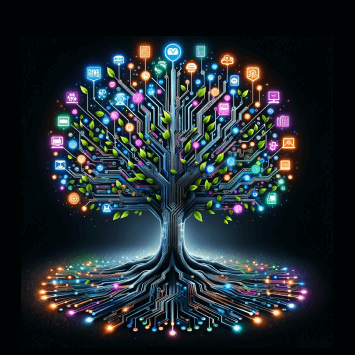As we venture into 2024, the impact of AI marketing trends is more profound than ever. AI is transforming marketing by dramatically enhancing efficiency, speed, and quality. Specialists using AI tools finish 12.2% more tasks, work 25.1% faster, and produce 40% higher quality results than those without AI. These efficiency gains underscore the importance of integrating artificial intelligence into marketing strategies, which are becoming increasingly vital in a rapidly evolving digital landscape. Here are the top AI-driven marketing trends set to shape the industry in the coming year.
1.Hyper-Personalization Through AI
AI enables hyper-personalization by analyzing vast datasets to deliver tailored content and offers to individual consumers. This trend drives higher engagement rates and customer satisfaction, making it a cornerstone of modern marketing strategies.
A real case of hyper-personalization through AI comes from Amazon, which has effectively utilized AI-driven hyper-personalization to enhance customer experiences and drive sales. Amazon’s recommendation engine analyzes vast amounts of customer data, including past purchases, browsing history, and even the items left in the shopping cart, to provide highly personalized product suggestions. This strategy has been a significant contributor to Amazon’s sales growth and customer loyalty.
Another notable example is Netflix, which uses AI to tailor viewing suggestions based on a user’s past viewing habits, ratings, and even the time spent on specific genres. This hyper-personalization helps keep users engaged and reduces churn rates, making it a cornerstone of Netflix’s customer retention strategy.
If we were to implement hyper-personalization through AI in a fintech app, it could be highly effective in creating tailored user experiences. For example, consider a fintech app named “SavvySaver” that notices its users have diverse spending habits. By leveraging AI, the app could analyze each user’s financial behavior to offer personalized advice and solutions.
For instance, when a user like Sarah, a recent graduate, joins the app, the AI could assess her financial situation and suggest a savings plan tailored specifically for her student loans. This approach would make Sarah feel understood and more engaged with the app, potentially leading to a 20% increase in her savings. This example illustrates how AI-driven hyper-personalization can be a game-changer in fintech by making financial management more relevant and engaging for users.
2.Enhanced Customer Experience with AI Chatbots
Other AI marketing trends include the increasing adoption of AI chatbots for customer service. AI chatbots provide instant, personalized responses to customer inquiries, improving customer satisfaction and freeing up human agents for more complex tasks. This enhances customer service efficiency and scalability.
For example, in a leading fintech company, AI chatbots for customer service have been employed to handle a range of financial services, including onboarding new customers, streamlining the Know Your Customer (KYC) processes, detecting fraud, and offering personalized investment advice.
These chatbots use advanced machine learning algorithms to analyze customer interactions and financial data, enabling them to provide relevant and personalized recommendations. For instance, they can guide users through setting up accounts, offer tailored financial advice based on individual spending habits, and even detect unusual transactions that may indicate fraudulent activity. This integration of AI chatbots not only improves the overall customer experience by providing instant, accurate support but also allows the company to scale its customer service operations efficiently, handling a large volume of inquiries with minimal human intervention.
By automating routine tasks and providing personalized service, these AI-driven chatbots help fintech companies enhance customer satisfaction, build trust, and increase operational efficiency.
3. Voice Search Optimization
With the rise of voice-activated devices, optimizing content for voice search is becoming crucial. AI tools analyze voice search data to help businesses optimize their content, ensuring that it appears in voice search results.
A real case of voice search optimization comes from the retail sector, where a company optimized its website to accommodate voice search queries. They focused on using natural language processing and conversational long-tail keywords that align with how users typically speak when using voice assistants like Google Home or Amazon Echo. For example, instead of simply targeting keywords like “running shoes,” they optimized for more conversational phrases like “Where can I find comfortable running shoes near me?”
This strategic optimization led to a noticeable increase in visibility within voice search results. As a result, the company saw a significant boost in both online and in-store traffic, highlighting the effectiveness of voice search optimization in improving customer engagement and sales. Additionally, by ensuring that their business details were consistently updated across platforms like Google My Business, they further enhanced their local search rankings, making it easier for voice search users to find and visit their stores.
This example underscores how effectively aligning SEO strategies with voice search can yield tangible business benefits, particularly in sectors where location-based queries are common and have high purchase intent.
How voice search optimization can be implemented into fintech? Imagine a fintech firm noticing a significant increase in voice search queries. To capitalize on this trend, they optimized their website to ensure that users could effortlessly find information about loans and investments through smart speakers. For example, one evening, a busy parent asks, “Alexa, what are today’s best mortgage rates?” and the firm’s service, let’s call it FinTrack, appears as the top result. This strategic adjustment leads to a 22% increase in traffic generated from voice search, demonstrating the impact of voice search optimization on user engagement and visibility in the fintech industry.
4. GenAI-Powered Search vs Organic Web Traffic
Generative AI tools like ChatGPT and Google’s Search Generative Experience (SGE) are leading to a decline in organic web traffic. As users get answers directly from AI without clicking through to websites, marketers must focus on creating high-quality content that AI will reference in search results.
A real case illustrating the impact of Generative AI on organic web traffic comes from a study that analyzed the effects of Google’s Search Generative Experience (SGE) on several websites. The findings showed that after the introduction of generative answers by Google’s SGE, there was a significant decrease in click-through rates (CTR) for organic search results. Specifically, websites experienced an average decrease in organic traffic of up to 64% in the worst-case scenarios. This was due to users getting more comprehensive answers directly on the search results page, reducing the need to click through to actual websites.
For example, in one model, 23 technology-focused websites were analyzed, and it was found that 64% of the top-ranking keywords lost their positions in the SGE snapshot carousel, leading to substantial traffic drops. However, there were a few cases where traffic actually increased for certain keywords that ranked better in the SGE. This case study emphasizes the need for businesses to adapt their SEO strategies by focusing on creating high-quality content that AI tools are likely to reference in their generated answers, potentially mitigating the decline in organic traffic
5. Predictive Analytics in Marketing Campaign Optimization
Artificial intelligence in marketing has revolutionized how predictive analytics allows marketers to anticipate future trends and customer behaviors. By analyzing historical data, predictive analytics in marketing helps businesses allocate resources more effectively and optimize their marketing strategies in real time.
A real case of predictive analytics in marketing for Campaign Optimization can be seen in how some retail and e-commerce companies have leveraged this technology to refine their marketing strategies. By using predictive analytics, these businesses have been able to analyze historical data, customer behavior, and past campaign performance to make data-driven decisions that optimize future marketing efforts.
For example, one retail company used predictive analytics to determine the optimal timing for launching a new product. By analyzing data on customer purchasing patterns, they were able to predict the most effective time of year, day of the week, and even the time of day to launch their campaign. This led to a significant increase in campaign effectiveness, demonstrating how predictive analytics in marketing can fine-tune efforts and reduce the risk of relying on guesswork.
These examples highlight how artificial intelligence transforms predictive analytics in marketing campaigns by providing clear, actionable insights that help businesses allocate resources more efficiently and optimize their strategies in real-time.
6. Topical Generative AI Assisting on a Customer Journey
Topical generative AI creates content tailored to specific industries or customer needs, enhancing customer journeys. This trend allows brands to provide interactive demos, personalized narratives, and dynamic virtual assistance, improving engagement and decision-making.
A real-world example of how Topical Generative AI can assist on a customer journey comes from the case of a global insurance leader that used Generative AI to optimize its regression testing processes. The company faced challenges with a high volume of manual test scripts, leading to inefficiencies and long test cycles. By implementing Generative AI, the insurer was able to automate and streamline these processes, significantly improving test coverage and overall quality.
This AI-driven approach allowed the company to transform its customer journey by delivering faster, more reliable services. The enhanced efficiency led to a 35% optimization in regression testing and a 32% reduction in overall quality assurance costs. This example demonstrates how Generative AI can be tailored to specific industry needs, improving not only operational efficiency but also the overall customer experience by providing more timely and accurate services
AI Marketing Transformation Packages
Are you ready to lead the AI trends in your business? At Octogamma, we specialize in implementing the latest AI marketing strategies that will set your business apart and keep you ahead of the competition. With the best AI tools, innovative frameworks, and strategic insights, we help you reduce marketing costs, streamline your team’s efforts, and fuel growth with data-driven approaches that guarantee exceptional ROI.
Key AI Marketing Consulting Solutions Offered
Department Transformation
Empower your marketing team with our expert guidance. Our team will work side-by-side with your department, coaching them step-by-step on implementing advanced marketing techniques and AI tools tailored to your business needs, enhancing daily operations, and driving sustainable growth.
Personal Education
Unlock the full potential of AI in marketing with our 45-module course. We guide you through integrating AI across all existing channels, offering a deep dive into strategies that revolutionize your marketing efforts. Perfect for teams looking to gain a competitive edge in the AI.
7. Programmatic Advertising with AI
AI-driven programmatic advertising automates the buying of ad space in real-time, optimizing bids and placements based on performance data. This leads to more efficient ad spending and higher conversion rates. By leveraging AI strategies, businesses can ensure that their ads are shown to the most relevant audiences, at the right time, and on the right platforms, all without the need for constant manual oversight. This automation allows for continuous improvement, as AI algorithms learn from past performance to enhance future campaigns.
Leading companies like Google, Adobe, and Amazon have already integrated AI-driven programmatic advertising into their demand-side platforms (DSPs), recognizing the transformative potential of AI marketing. Google Display & Video 360 (DV360) utilizes AI to enhance audience targeting and creative optimization. The platform analyzes user behavior and contextual data in real-time, allowing businesses to serve highly personalized ads that resonate with their audience. Adobe Advertising Cloud incorporates its Sensei AI to provide predictive analytics and automated bidding. This AI integration helps businesses forecast campaign outcomes and optimize their ad spend across multiple channels, ensuring maximum impact. Similarly, Sizmek by Amazon leverages AI to optimize ad delivery and placements by tapping into Amazon’s extensive data resources. This ensures that ads are placed where they are most likely to achieve high engagement, thus improving overall campaign effectiveness.
Businesses that adopt these AI-driven programmatic advertising platforms stand to benefit significantly from this trend. By switching to DSP platforms that already implement artificial intelligence enhances targeting precision, allows for dynamic adjustments in real-time, leading to better resource allocation and higher ROI. For example, a retail brand using DV360 might see a significant increase in online sales during a campaign, thanks to AI’s ability to identify and target high-value customers more accurately than traditional methods.Incorporating AI marketing into programmatic advertising strategies is becoming essential for businesses that want to stay competitive in the digital landscape. As these platforms continue to evolve, companies that embrace AI-driven programmatic advertising will likely enjoy sustained growth, improved customer engagement, and greater marketing efficiency.
Incorporating AI marketing into programmatic advertising strategies is becoming essential for businesses that want to stay competitive in the digital landscape. As these platforms continue to evolve, companies that embrace AI-driven programmatic advertising will likely enjoy sustained growth, improved customer engagement, and greater marketing efficiency.
8. AI in Influencer Marketing
AI helps identify the most relevant influencers for a brand by analyzing their follower demographics, engagement rates, and content style. It also addresses challenges in AI influencer marketing by tracking the effectiveness of influencer campaigns in real-time, allowing for quick adjustments to maximize ROI and better understand how to use AI for marketing.
A real case of AI in influencer marketing can be seen in how BENlabs, a technology company, leverages AI to optimize influencer marketing strategies. BENlabs uses AI to identify the most relevant influencers by analyzing vast datasets, including engagement rates, audience demographics, and content relevance. This approach directly tackles challenges in AI influencer marketing by enabling brands to precisely match with influencers whose followers align closely with the brand’s target audience.
In addition, BENlabs employs AI tools to monitor the effectiveness of influencer campaigns in real-time. This includes tracking key metrics such as engagement, brand mentions, and conversions, which helps in making quick adjustments to maximize ROI. The platform also uses predictive analytics to forecast the potential success of future campaigns, offering marketers a clear understanding of how to use AI for marketing and providing data-driven insights that help in planning and resource allocation.
9. AI-Enhanced Email Marketing
AI personalizes email marketing by analyzing user behavior and preferences to send tailored messages at optimal times. It can also predict the likelihood of email opens, clicks, and conversions, allowing marketers to refine their email strategies.
10. AI-Assisted Decision Making Taking the Central Place
AI enhances decision-making by processing vast amounts of data quickly and without bias, providing businesses with data-informed insights. However, it’s essential to combine AI insights with human judgment, especially in situations requiring cultural or contextual understanding.
11. AI in Social Media Marketing
AI tools analyze social media trends, monitor brand sentiment, and create content, ensuring that social media strategies are timely and relevant. This allows brands to stay ahead of the curve and engage effectively with their audience.
A real case of AI in social media marketing within the fintech industry comes from the example of Cash App. Cash App has effectively utilized AI to enhance its social media engagement by analyzing trends, monitoring brand sentiment, and creating content that resonates with its audience.
One notable strategy Cash App employed was integrating AI-driven challenges and games on social media platforms, which were designed to engage users in a fun and interactive way. For instance, Cash App regularly hosts in-game challenges and streams that encourage users to participate in real-time, with the possibility of winning prizes. This approach not only keeps the audience engaged but also significantly boosts the brand’s visibility and interaction on social media.
12. AI-Driven Content Creation
AI tools generate content at scale, from product descriptions to social media posts, optimizing it for SEO and audience relevance. This allows marketers to focus on strategy while AI handles content production, ensuring consistency and quality across platforms.
A tech company, “TechTrends,” was determined to keep its blog vibrant with cutting-edge AI content, but its small team struggled to keep up with the demand. To alleviate this, they integrated AI to assist with brainstorming, structuring content, and adding SEO keywords. AI also acted as a research tool, gathering data and generating topic ideas. This approach allowed the team to produce more content in less time, with articles that were not only informative but also engaging. One day, a well-structured article about blockchain blew up, driving 25% more traffic to their site. The content team polished the drafts, while AI kept the ideas flowing, making the blog a hub for industry insights.
Text Content Creation
In the realm of text content, AI strategies have revolutionized how businesses generate articles, blog posts, and even emails. With AI for content creation, it’s possible to produce high-quality written content in a fraction of the time it used to take. Tools powered by natural language processing (NLP) can craft compelling narratives, tailor content to specific audiences, and even adjust the tone and style to match brand guidelines. This level of customization is pivotal in maintaining brand consistency while scaling content production efforts. The use of AI content tools ensures that the messaging is not only consistent but also optimized for search engines, making it more likely to reach and engage the target audience.
Image and Visual Content Creation
AI-driven technologies are also transforming the way images and visual content are created. From generating original artwork to enhancing existing visuals, AI tools can automate and streamline processes that were once time-consuming. For instance, AI can now create personalized infographics, social media graphics, and even product images that are tailored to specific campaigns or audience segments. These AI strategies allow marketers to quickly adapt visual content to different platforms and audiences, ensuring that every piece of content is relevant and engaging. By using AI for content creation, businesses can produce a wide array of visual assets that maintain a consistent look and feel, aligning with the overall brand strategy.
Video Content Creation
Video content, which is increasingly vital in digital marketing, is also benefiting from AI innovations. AI tools can now automate the editing process, generate video scripts, and even create animations or deepfakes that were once the domain of skilled professionals. This democratization of video production means that high-quality video content is more accessible than ever before. With AI content tools, brands can produce engaging videos at scale, ensuring that video marketing efforts are consistent, on-brand, and tailored to the needs of the audience. Furthermore, AI can analyze audience engagement with video content and provide insights that inform future video strategies, making the content creation process more data-driven and effective.
Other Types of Content Creation
Beyond text, images, and video, AI strategies are expanding into other types of content creation, including audio, interactive content, and even virtual experiences. For instance, AI can generate personalized audio content like podcasts or voiceovers, making it easier for brands to connect with audiences through auditory channels. Additionally, AI-powered tools are being used to create interactive content such as quizzes, games, and AR experiences that drive deeper engagement. These AI for content creation tools are opening up new avenues for brands to reach their audiences in innovative and personalized ways, further enhancing the overall customer experience.
AI content tools are revolutionizing the content creation landscape across all formats. By incorporating AI strategies into their content workflows, businesses can not only scale their content production but also enhance the quality and relevance of the content they deliver to their audiences.
Summary
As AI continues to revolutionize marketing, staying ahead of these trends is crucial for success in 2024. By integrating AI into various aspects of marketing, businesses can improve efficiency, personalization, and decision-making. However, in this rapidly evolving landscape, partnering with an agency that understands and leverages these AI-driven strategies will be essential. Such partnerships can drive better results, enhance efficiency, and ultimately save money, ensuring that businesses stay competitive and thrive in the AI era.

Author: INNA CHERNIKOVA
Marketing professional with over 12 years of experience at the CMO level, with a T-shaped, data-driven approach specializing in building digital marketing strategies and early-stage development. She has led and managed the marketing of digital products and fast-growing international startups across fintech (covering securities, payment solutions, CEX, Web3, DeFi, blockchain, and crypto), artificial intelligence (AI), IT, and advertising sectors. Inna has deep expertise in tailoring marketing to the needs of different business models, including B2B, B2C, SaaS, marketplaces, and service providers.






